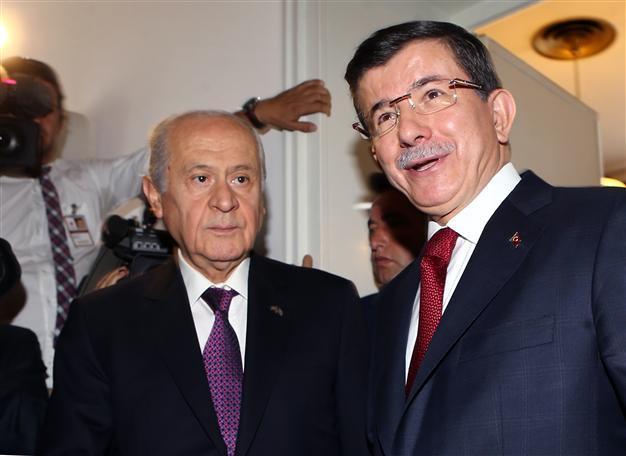MHP leader to meet Turkish PM a week ahead of deadline
ANKARA

AP photo
Nationalist Movement Party (MHP) leader Devlet Bahçeli and the leader of the Justice and Development Party (AKP), incumbent Prime Minister Ahmet Davutoğlu, are set to meet on Aug. 17 to decide whether to form a government or not with just around a week left until the expiration date of a 45-day deadline.
Talks on forming a coalition between the AKP and the Republican People’s Party (CHP) broke down on Aug. 13, making an autumn election almost inevitable and leaving the incumbent ruling party having to turn to the nationalist MHP for support.
Davutoğlu has almost a week until a deadline to form a coalition, after which a fresh election is likely to be called.
Days after making clear last week they would not roll over and back a minority government, the MHP has authorized its leader with full authority concerning making President Recep Tayyip Erdoğan’s aim of taking the country to a snap election with the ruling party in control look increasingly difficult.
The decision was made at a Central Executive Board (MYK) meeting of the party chaired by Bahçeli on Aug. 15. During the meeting, Bahçeli warned executives over the prospect of a snap election, while noting he wanted to see what Davutoğlu would offer during their meeting scheduled for Aug. 17.
Ahead of his meeting with Bahçeli, which is scheduled to take place at 2:00 p.m. at the latter’s office in parliament, Davutoğlu gathered on Aug. 16 with his party’s executives, who have prepared for the meeting by holding contacts with executives from the MHP, the state-run Anadolu Agency reported.
Davutoğlu plans to go to the meeting with Bahçeli “without any prejudices,” the agency said, without citing any sources. According to the agency, the incumbent prime minister was expected to put emphasis on particulars on which the parties can reach a consensus. Davutoğlu will raise “a lot of options, including forming a government based on joint and agreed matters and going to elections,” the report said.
The AKP failed to hold its majority in a general election on June 7, leaving it unable to govern alone for the first time since it came to power in 2002 and plunging Turkey into uncertainty not seen since the fragile coalitions of the 1990s.
Following the latest talks with the CHP on Aug. 13, Davutoğlu urged parliament to call for a new vote as soon as possible, apparently hoping for an agreement with the MHP that would allow his government to stay in power until the new election takes place.
But the MHP said it had no interest in propping up an AKP minority administration.
“That would be a minority government. We would reject this,” MHP deputy chair Mevlüt Karakaya told Reuters, saying unless the AKP was prepared to accept nationalist conditions for a full coalition there was little point even negotiating.
In a written statement released late on Aug. 14, Bahçeli said he would like the AKP and the CHP to gather once more to resolve the coalition deadlock, as he dubbed such an effort a “historical obligation and national responsibility.”
“As it is not possible for us to look at a reelection positively, a warm approach to forming a minority government or election government is unsuitable for us,” Bahçeli said, while, however, noting his party was ready to take responsibility if its pre-conditions announced earlier were accepted.
The MHP has made the full abandonment of the peace process involving militants of the outlawed Kurdistan Workers’ Party (PKK) and curbing President Recep Tayyip Erdoğan’s influence over daily politics two of its core conditions, neither of which the AKP is likely to compromise on.
Meanwhile, remarks delivered over the weekend by an MHP deputy on prospects of an early election were rather bold.
An early election would have “dangerous results” for Turkey, particularly at a time when terrorist attacks by the PKK have escalated, MHP Aksaray deputy Turan Yaldır said on Aug. 15.
“Our country is passing through a new democracy test after the June 7 election. We should understand well the message saying ‘form a coalition,’ which came out of the ballot boxes,” Yaldır said, underlining reparation of a wrong decision to hold an early election with such wrong timing would be very difficult.
